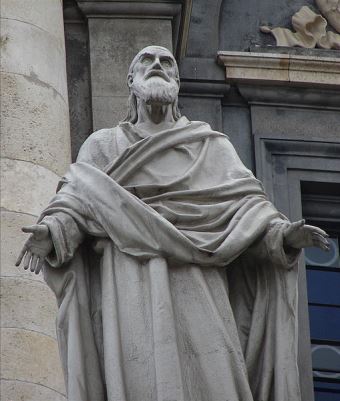CHURCH HISTORY
Church Foundations
Polycarp
By Brandon Markette

Polycarp wrote his letter to the Philippians around 118 A.D. This solitary letter is a great encouragement to the modern Christian because of its references to both Old and New Testament writings. It's clear from this letter that the church, at least by 118 A.D., viewed the New Testament as the authoritative writings of the Apostles. Polycarp uses them to call the Philippians to holy living. When we hear, today, that the Bible was developed by men in the 4th century A.D., Christians may rest assured that in the early 2nd Century the Church already saw the Apostles' writings as the authoritative word of God.
We also remember Polycarp for his opposition to an early Heretic, Marcion. During a visit to Rome, Polycarp ran into a teacher named Marcion. Marcion was the son of a Bishop, but held very unorthodox views of Christianity. He believed Jesus only appeared to be human. He believed the God of the Old Testament was not the same God of the New Testament. Jesus, the son of the New Testament God, came to defeat the Old Testament God. Certainly these views placed Marcion in the camp of false teacher. To support these ideas, Marcion developed his own list of Scripture, discarding any of the New Testament's books which might contradict his claim. Many early Christian writers wrote against his views, even after Marcion's death. After this encounter, Polycarp described Marcion as "the firstborn of Satan."
Polycarp's death is the only other part of his life which we know much about. It is a good thing we do, too. Polycarp's martyrdom attracted non-Christians to Christ, inspired Christians of his age, and continues to inspire us today. In 156 A.D. Polycarp was arrested by the Romans. At trial, the Roman Governor called upon Polycarp to recant his faith in Christ, to which he famously replied, "These eighty and six years have I served my Lord and He never did me any harm, and I cannot deny my Lord and Master now." When warned that he would be burnt at the stake, Polycarp responded that the fires of the stake last but a moment, whereas the fires of hell last for an eternity. Thus, the Roman Governor sentenced Polycarp to die at the stake.
As they prepared the stake, the Roman Soldiers tried to secure Polycarp with rope or nails. Refusing, Polycarp told them, "He who grants me to endure the fire will enable me also to remain on the pyre unmoved, without the security you desire from nails." Thus did Polycarp die at the stake. So amazing was his peace in this death that word spread far and wide. The chronicler of his death noted that even non-Christians spoke of Polycarp's execution.
As modern Christians face various forms of opposition, they should take encouragement from the example of Polycarp. Taking strength from his faith in Christ, he remained faithful to Christ through his life and through his death.
Image Source
Statue: Polykarp, Ferdinand Edvard Ring 1884, Frederikskirken, Marmorkirken, Frederikstaden, KÝbenhavn
Photo: Orf3us, September 2010, Public Domain
Tags: History-Apologetics | Theological-Beliefs
comments powered by Disqus
Published 3-31-2014

